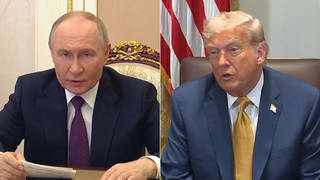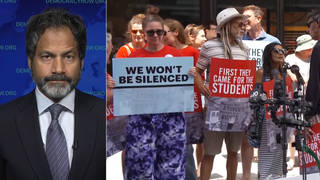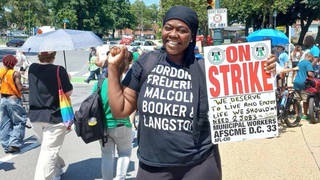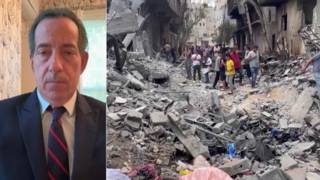
Topics
Guests
- Adam Hochschildjournalist, author and lecturer at the Graduate School of Journalism at the University of California at Berkeley.
The 11th hour of the 11th day of the 11th month—that’s when World War I ended in 1918, 100 years ago this weekend. On Sunday, world leaders gathered in Paris to pay tribute to the dead, marking the anniversary of the armistice of what had been described as the “war to end all wars.” Following the formal ceremony at the Arc de Triomphe, Macron and German Chancellor Angela Merkel attended a peace conference with dozens of heads of state, including Russian President Vladimir Putin and Turkish President Recep Tayyip Erdogan. Trump was reportedly the only one among 72 leaders to skip the meeting. Trump also faced widespread criticism for his decision to cancel a visit to a U.S. military cemetery in France on Saturday because it was raining. To find out more about the significance of the war and its commemoration, we speak with Adam Hochschild, lecturer at the Graduate School of Journalism at the University of California at Berkeley. His most recent book, published last month, is titled “Lessons from a Dark Time and Other Essays.” His article for The New Yorker earlier this month was headlined “A Hundred Years After the Armistice.”
Transcript
AMY GOODMAN: The 11th hour of the 11th day of the 11th month—that’s when World War I came to an end a hundred years ago this weekend. On Sunday, world leaders gathered in Paris to pay tribute to the dead, marking the anniversary of the armistice of what had been described as the “war to end all wars.” Between 1914 and 1918, about 10 million civilians perished, almost 10 million soldiers were killed, another 21 million wounded. On Sunday, French President Emmanuel Macron used his address at the ceremony to caution against the dangers of nationalism.
PRESIDENT EMMANUEL MACRON: [translated] This vision of France as a generous nation with a vision which carries universal values has been, in those dark times, exactly the opposite of the selfishness of a people which only looks at its own interests, because patriotism is the exact opposite of nationalism. Nationalism is its betrayal. By pursuing our own interests first, with no regard to others, we erase the very thing that a nation holds most precious, that which gives it life and makes it great: its moral values.
AMY GOODMAN: Macron’s comments were widely viewed as a rebuke of President Trump, who has openly described himself as a nationalist. Just before the summit, President Macron also called for the formation of a European army. He said, quote, “We have to protect ourselves with respect to China, Russia and even the United States of America. We need a Europe which defends itself better alone, without just depending on the United States, in a more sovereign manner.”
Following the formal ceremony at the Arc de Triomphe in Paris, Macron and German Chancellor Angela Merkel attended a peace conference with nearly 80 heads of state, including Russian President Vladimir Putin and Turkey’s Recep Tayyip Erdogan. President Trump did not attend the Paris Peace Forum, apparently the sole leader who did not, returning to the United States shortly after it began. Yes, Trump reportedly the only one among 72 leaders to skip the meeting. Trump also faced widespread criticism for his decision to cancel a visit to a U.S. military cemetery in France on Saturday because it was raining. He canceled his visit to pay honor to the U.S. World War I war dead.
To find out more about the significance of the war and its commemoration, we go now to Berkeley, California, to talk to Adam Hochschild, lecturer at the Graduate School of Journalism, University of California, Berkeley. His most recent book, published last month, Lessons from a Dark Time and Other Essays. His article for The New Yorker earlier this month headlined “A Hundred Years After the Armistice.” His other books include To End All Wars: A Story of Loyalty and Rebellion, 1914-1918, King Leopold’s Ghost, as well. Adam Hochschild was a co-founder of Mother Jones magazine.
Adam, welcome back to Democracy Now! First, share your response to what took place this weekend on the centennial of World War I.
ADAM HOCHSCHILD: Hi, Amy. It’s always good to be with you. I think my main feeling was disappointment—not for the first time—with how President Trump responded to this extraordinary anniversary. Here we are, exactly, yesterday, a hundred years to the day after this terrible war ended, and President Macron of France at least wanted to use the anniversary to bring together world leaders to talk about peace and to talk about how wars like this could be averted in the future. And instead, Trump ignored that, just went through very perfunctory paying respects to the American dead—not the ones that he would have had to visit in the rain, but others—and then turned around and went home.
I think the lesson that we ought to take from looking back at the First World War is that wars break out very easily. People always think starting a war is going to solve a problem. It usually creates all sorts of other problems instead. Look at what’s happened with the United States’ ventures in Iraq and in Afghanistan. And an anniversary like this is a time for sitting down, thinking about that, talking about that—not turning your back on other world leaders and rushing home.
AMY GOODMAN: Quite something. President Trump, on Saturday, while other world leaders visited the cemeteries of their war dead, President Trump, though it was completely planned, he said, because of the rain, he wasn’t going to the cemetery, where over—well, how many soldiers? I think over 1,000, perhaps 2,000, American soldiers were buried. If you can talk about who these soldiers are who died in World War I?
ADAM HOCHSCHILD: Well, these were men who volunteered and men who were drafted and who went to Europe in the last months of the war. The United States—you know, World War I lasted for four-and-a-half years, from the summer of 1914 until November 11th, 1918. For the first two-and-a-half of those years, the United States was officially neutral, even though it was selling huge amounts of arms and armaments and ammunition and so forth to the Allied countries—Britain and France, above all. But the U.S. was not involved in the fighting.
Then, the United States joined in, in the spring of 1917. It took really a little more than a year to get large numbers of American troops sufficiently trained. But starting in the summer of 1918, huge numbers of Americans, young Americans, went to France very eager to fight, as young men so often and so tragically are all over the world. In fact, when those U.S. troops got to France, many of the men assigned to rear areas began to do what the military called deserting to the front. They had come to Europe to fight and to see glory in battle, and not to be loading supplies in the rear somewhere. So, by the end of the war, there were some 2 million American troops in France, and they certainly supplied an important ingredient in the forces that brought the Allied armies to victory. They were fresh and raring to go, unlike the soldiers of the countries that had already been fighting in Europe for more than four years.
Roughly a little over 100,000 Americans perished in that war, about half of them in combat and the other half from the great influenza epidemic that swept through the world at that time, killing a huge number of people. But that flu epidemic was closely related to the war because it was first medically noticed on a U.S. Army base in Kansas. And as American troops went to Europe, they carried the flu with them, and then it spread very rapidly through European countries, as well. And, of course, any kind of disease like that spreads even faster when the people who are suffering from it are in close confinement with lots of others, in places like troop ships, army barracks, trenches and so forth.













Media Options